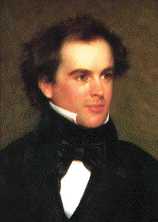July 4: Nathaniel Hawthorne
Nathaniel Hawthorne (1804)
It was on this date, July 4, 1804, that American novelist Nathaniel Hawthorne was born in Salem, Massachusetts. The author of The Scarlet Letter (1850) and The House of the Seven Gables (1851) was a descendent of John Hathorne, one of the judges in the Salem witchcraft trials of 1692, the only judge not to repent after the trials. Guilt for this association caused Hawthorne to add the w to the spelling of his name. Reared by his mother, and educated at Bowdoin College in Maine, Hawthorne later became friends with the Transcendentalists of Concord: Ralph Waldo Emerson, Henry David Thoreau, and Bronson Alcott. He married one of their number, Sophia Peabody, in 1842 and worked at government jobs while composing his first novels. He also published a collection of short stories in 1837 called Twice-Told Tales. In 1850, Hawthorne met and befriended future Moby-Dick author Herman Melville. The next year, Melville dedicated his soon-to-be classic novel to Hawthorne, “In token of my admiration for his genius.”
Hawthorne’s novels examine moral and spiritual conflicts from a uniquely American perspective: adultery and justice in The Scarlet Letter, for example. The novel, published when he was 46, was an immediate success and established his reputation. The Scarlet Letter portrays Puritanism as somber and repressive and, in fact, this is the faith he discarded at college. Hawthorne never bothered to attend church as an adult and one biographer* observes that, “His own family did not know what his opinions were.” It seems that, as a Transcendentalist, Hawthorne believed in an impersonal God and supernaturalism, but not in personal immortality. He never fully escaped his Puritan notion of sin, though his was tempered by compassion toward the sinner. Nathaniel Hawthorne died 19 May 1864, aged 59, in Plymouth, New Hampshire.
* F.S. Stearns, The Life and Genius of Nathaniel Hawthorne, 1906.
Originally published July 2003 by Ronald Bruce Meyer.


